Literature
TECHNOLOGY
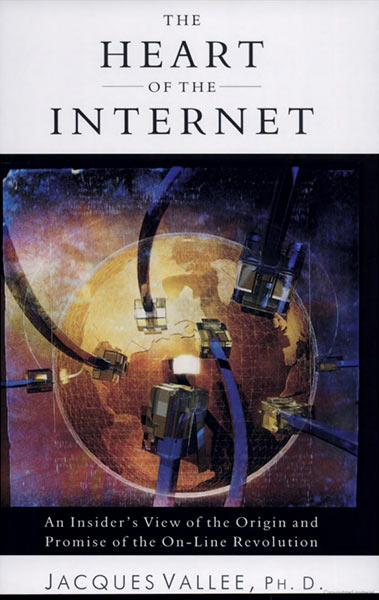
The Heart of the Internet
(2003)
An Insider’s View of the Origin and Promise of the On-line Revolution
“Based on a deep understanding of the Internet and its origins, this book presents a compelling warning. It is a welcome antidote to both the naive utopianism of the Internet bubble, and to oppressive liberty-quenching actions by global corporations and governments alike. Read this and take nothing for granted – the Internet will remain a force for freedom only if you help protect it. “
Paul Saffo
Director, the Institute for the Future

Au Coeur d’Internet
(2004)
Un Pionnier Français du Réseau examine son histoire et s’interroge sur l’avenir
“Prenant pour base une profonde compréhension d’Internet et de ses origines, ce livre lance un grave avertissement. C’est un antidote qui vient àpoint après l’utopie naà¯ve de la “bulle Internet” et les mesures d’étouffement des libertés privées qui sont prises actuellement par les multinationales et les gouvernements. Lisez ce livre et remettez tout en question: Internet ne restera une force pour la liberté que si vous contribuez àle sauvegarder.”
Paul Saffo
Directeur àl’Institut pour le Futur en Californie

Les Enjeux du Millénaire
(1998)
Capital Risque et Innovation
Quel est le secret du succès économique actuel des Etats-Unis? Jacques Vallée apporte une réponse àcette question : quelques spécialistes, en Californie, ont découvert le moyen de favoriser et de faire fructifier l’innovation.
Ce moyen, c’est le capital-risque. Ces professionnels sont des financiers, des entrepreneurs qui prennent le temps d’écouter les inventeurs et soutiennent le démarrage des projets prometteurs dans les domaines de l’informatique, de l’électronique, du multimédia, des matériaux, du génie génétique, etc. Il ne s’agit pas simplement d’argent : les capital-risqueurs aident les innovateurs à organiser leur société, àgérer leur développement. Ils sont les partenaires des inventeurs, aux antipodes de l’image classique du capitaliste.
Jacques Vallée est l’un d’eux. Installé depuis trente ans dans la Silicon Valley, il a vécu la naissance du venture capital et le prodigieux essor des nouvelles technologies qui en résulte. Dans un langage simple, au travers de multiples anecdotes, il raconte comment le capital-risque a transformé le monde.
Et il s’interroge : Pourquoi pas en Europe? Son constat est sévère: notre manque de créativité industrielle est un problème de culture qui touche l’économie et la finance, mais aussi l’éducation, la recherche, etc. En France, on assiste à un véritable blocage mental
Mais Jacques Vallée reste optimiste et propose des solutions. Sera-t-il écouté?
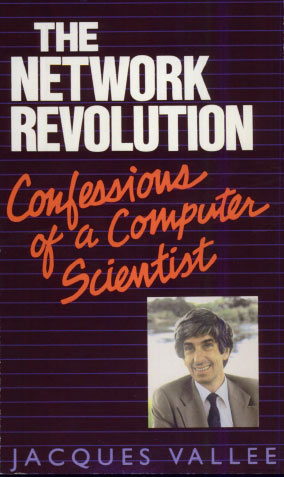
The Network Revolution
(1982)
Confessions of a Computer Scientist
The Network Revolution, the personal view of an erudite, compassionate insider who helped shape this technology, penetrates behind the scenes to reveal the human side of computer science as it has never been shown before.
Jacques Vallée writes in nontechnical language. He takes the mystery out of the technology and shows how computer science has suddenly put humanity at a major crossroads. The choices which will shape our future are being made right now. This book and its readers will influence those decisions.
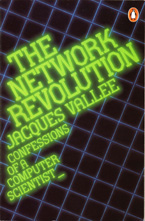
The Network Revolution
(1984)
(British edition of The Network Revolution)
“Vallee is a compelling storyteller – His anecdotes are highly interesting and bear the ring of truth.”
San Francisco Chronicle
“Network Revolution is a thought-provoking book by a bright, articulate computer scientist. And one who has a heart.”
Management Technology
“In the early 1990’s, when the Internet was about to be discovered by mainstream media, I found this book (then already ten years old) on a friend’s bookshelf. I started reading a chapter about some Midnight Irregulars and immediately recognized what the author was describing. That was enough for me to want to read the whole book. The author goes on to make a number of predictions, some of which seem remarkably accurate today. Our hardware may be thousands of times faster, but have we really made any significant progress since this book was written?”
A reader’s comment posted on Amazon.com, 1998
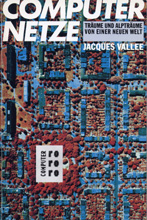
Computer Netze
(1984)
(German edition of The Network Revolution)
Mit dem Vordringen von Computern in unseren persönlichen Lebensraum sehen wir uns mit einemmal an eine entscheidende Wegkreuzung katapultiert. Bewegen wir uns auf einen total kontrollierten Polizeistaat oder auf eine humanere, demokratischere Gesellschaft zu? Noch haben wir die Wahl, noch kÖnnen wir die Richtung bestimmen.
In einer faszinierend bildhaften, unterhaltsamen Sprache berichtet Jacques Vallee, ein engagierter Informatiker, aus den Denklabors der Computerwissenschaft. Er enthà¼llt ein bedrohliches, gleichzeitig aber auch ein menschenfreundliches, kreatives und subversives Potential.
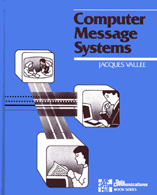
Computer Message Systems
(1984)
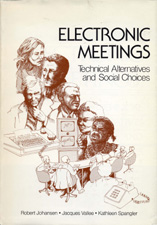
Electronic Meetings
(1979)
Electronic Meetings is more about meetings than electronics. It is about meetings that happen to be held over such media as audio, video, or computer-based teleconferencing. It is about alternatives to face-to-face meetings.
To explore the dynamics of use in detail, Electronic Meetings takes readers on an imaginary leap to a future world where various forms of teleconferencing are available for an international meeting. The meeting is triggered by an impending crisis – a drought in the fictitious African country of Camelia. It is a bilingual communication situation involving a mix of data interpretation, information exchange, negotiation and group decision-making. Participants represent local, regional and international perspectives. The setting is tense and demanding; the use of electronic media could either ease the tension or lead to total breakdown in communication.
A set of eight story-like scenarios illustrates these possibilities, highlighting the strengths and weaknesses of audio, video, and computer-based teleconferencing, as well as face-to-face meetings. Each scenario probes the ways in which media can be used both very effectively and very ineffectively. Together, the scenarios allow would-be users of teleconferencing to draw informed speculations about future uses and practical conclusions for present applications.
FINANCE
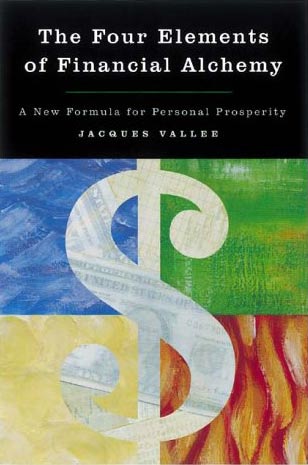
The Four Elements of Financial Alchemy
(2001)
A New Formula for Personal Prosperity
In the ancient tradition of alchemy, practitioners of the secret arts spent years searching for the philosopher’s stone – that elusive substance reputed to turn base metals into gold. In today’s booming economy, inexperienced investors are wagering their IRAs on IPOs, hoping a magical blend of stock options and Internet day trading will transform their modest savings into golden portfolios.
Without a clear understanding of investing basics or a practical plan for the future, many starry-eyed investors end up sacrificing their nest eggs to failed ventures, complicated tax penalties, and hidden service charges (…) Jacques Vallée uses the elements of ancient alchemy – Earth, Water, Air and Fire – as a framework for creation a prosperous financial strategy that integrates age-old principles with modern technology, financial wisdom and personal values.
PHENOMENA
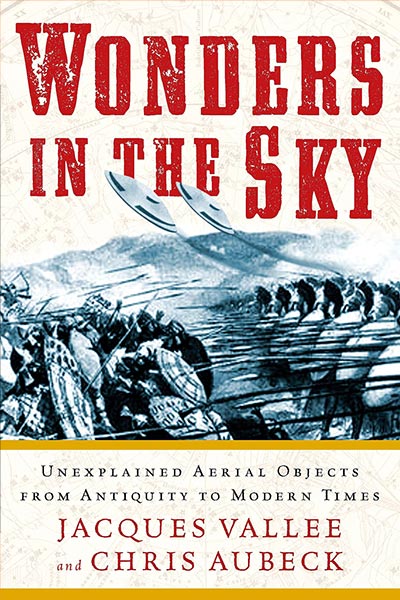
Wonders in the Sky
(2010)
Unexplained Aerial Objects From Antiquity to Modern Times
One of the most ambitious works of paranormal investigation of our time, here is an unprecedented compendium of pre-twentieth-century UFO accounts, written with rigor and color by two of today’s leading investigators of unexplained phenomena.
In the past century, individuals, newspapers, and military agencies have recorded thousands of UFO incidents, giving rise to much speculation about flying saucers, visitors from other planets, and alien abductions. Yet the extraterrestrial phenomenon did not begin in the present era. Far from it. The authors of Wonders in the Sky reveal a thread of vividly rendered-and sometimes strikingly similar- reports of mysterious aerial phenomena from antiquity through the modern age. These accounts often share definite physical features- such as the heat felt and described by witnesses-that have not changed much over the centuries. Indeed, such similarities between ancient and modern sightings are the rule rather than the exception.
In Wonders in the Sky, respected researchers Jacques Vallée and Chris Aubeck examine more than 500 selected reports of sightings from biblical-age antiquity through the year 1879-the point at which the Industrial Revolution deeply changed the nature of human society, and the skies began to open to airplanes, dirigibles, rockets, and other opportunities for misinterpretation represented by military prototypes. Using vivid and engaging case studies, and more than seventy-five illustrations, they reveal that unidentified flying objects have had a major impact not only on popular culture but on our history, on our religion, and on the models of the world humanity has formed from deepest antiquity.
Sure to become a classic among UFO enthusiasts and other followers of unexplained phenomena, Wonders in the Sky is the most ambitious, broad-reaching, and intelligent analysis ever written on premodern aerial mysteries.

Forbidden Science 3
(2017)
On the Trail of Hidden Truths, The Journals of Jacques Vallée 1980-1989
REMEMBERING IS THE DUTY OF THOSE WHO LIVE IN EXCEPTIONAL TIMES
The 1980s were a pivotal time in the development of venture capital that led to great innovations throughout the world. As recounted in this third volume of journals, Jacques Vallée found his passion in this world, while he witnessed with concern the increasing manipulation and disinformation that discouraged rational research into ufology. But he persisted in his first-hand UFO investigations in the US, Europe, and South America, and here strips from the historical record the secrecy behind which research into the paranormal was being conducted.

Forbidden Science 2
(1996)
California Hermetica, The Journals of Jacques Vallée 1970-1979
THESE THINGS REALLY HAPPENED AND SHAPED THE WORLD IN WHICH WE LIVE
With the end game in Vietnam and the turpitudes of Watergate in the background, the major topic of this second volume in the journals of Jacques Vallée is paranormal research. Vallée relates his behind-the-scenes experiences in California during the 1970s as the Human Potential Movement emerged, the Internet developed, and parapsychology secretly entered the physics laboratory. And all the while, as Vallée continued his examination of UFO encounters, the links to older mysteries became increasingly clear.

Forbidden Science 1
(1992)
A Passion for Discovery, The Journals of Jacques Vallée 1957-1969
IF SCIENCE REFUSES TO DEAL WITH THIS TOPIC, THEN WHAT IS SCIENCE FOR?
Beginning after the launch of Sputnik and ending with the landing on the moon, the first volume of Jacques Vallée’s journals details how UFOs, in the midst of a proliferation of sightings in the 1960s, became a forbidden science. In this beautifully written journal, Vallée reveals just how the scientific community was misled by the government, how the best data on UFOs was kept hidden, and how the public record was shamelessly manipulated.
“This dazzling diary offers a glimpse into the mind of a scientist who seems to challenge every misconception and established piety. It is replete with profoundly insightful, often devastating observations.” — Publishers Weekly
“The qualities that come through most clearly are Vallée’s love of people, his intense curiosity, and his willingness to march to his own drum…Vallée’s book will be a valuable resource in providing first hand insight into the early development of the UFO controversy.” — Professor Peter Sturrock, Stanford University
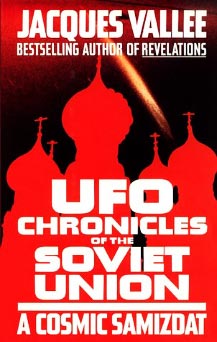
UFO Chronicles of the Soviet Union
(1992)
A Cosmic Samizdat
Before Gorbachev, the study of UFOs in Russia depended on samizdat dissemination, but with the advent of glasnost, publication of UFO sightings is no longer restricted, according to the author. In 1990, American ufologist Vallée ( Revelations ) visited the Soviet Union with French journalist Martine Castello to talk with scientists and interview those who claim to have contact with UFOs. Like accounts of sightings in this country, the Soviet sightings generally feature space vehicles either round or saucer-shaped, with creatures, if present, more or less anthropomorphic and ranging in height from three to 10 feet, some with three eyes or outsize mouths. Only believers in UFOs will find this report convincing.
Copyright 1992 Reed Business Information, Inc.

Revelations
(1991)
Alien Contact and Human Deception
In Revelations, the final volume of the Alien Contact Trilogy, Dr. Jacques Vallée presents startling evidence that well-constructed hoaxes and media manipulations have misled UFO researchers, diverting them from the UFO phenomenon itself. Vallée takes readers step by step into the tangled web of UFOlogy’s dark side, in an effort to clear the ever-thickening underbrush that has obscured the real nature of the UFO phenomenon.

Confrontations
(1990)
A Scientist’s Search for Alien Contact
In Confrontations, the second volume of his Alien Contact Trilogy, Dr. Jacques Vallée personally investigates forty astonishing UFO cases from around the world. He finds it shocking that professional scientists have never seriously examined this material. This book is about the hopes, experiences, and the frustrations of a scientist who has gone into the field to investigate a bizarre, seductive, and often terrifying phenomenon reported by many witnesses as a contact with an alien form of intelligence.

Dimensions
(1988)
A Casebook of Alien Contact
In Dimensions, the first volume of his Alien Contact Trilogy, Dr. Jacques Vallée reexamines the historical record that led to the modern UFO phenomenon and to the belief in alien contact. He then tackles the enigma of abduction reports, which come from various times and various countries, as well as the psychic and spiritual components of the contact experience. In the last portion of the book, he notes the factors that inhibit research into the phenomenon – the triple coverup and political motivations – and concludes that the extraterrestrial theory is simply not strange enough to explain the facts.

Messengers of Deception
(1979)
UFO Contacts and Cults
Too many cases of “accidental” alien contact…UFO cults praying to the skies…secret “psychotronic” weapons for bending the human mind. The evidence Jacques Vallée reveals, after many years of scientific investigation, adds up to something more menacing than monsters from outer space. Messengers of Deception documents the growing effect of UFO contact claims on our lives and of the belief systems prevalent in our society. It explores the hidden realities of the cults, the contactees, the murky political intrigues and the motivations of the investigators. “As suspenseful as a Hitchcock Thriller, brilliantly argued . . . a smashing achievement.” – Robert Anton Wilson

The Invisible College
(1975)
What a Group of Scientists Has Discovered about UFO Influence on the Human Race
What is the nature of unidentified aerial phenomena? Forty years ago a small cadre of dedicated researchers began actively investigating cases, interviewing witnesses, and exchanging data through a small, informal network of international contacts. Today this low-profile network, or “invisible college,” has grown into a larger, multi-nation volunteer research effort joined by many individuals. But the questions first raised 40 years ago remain current-and unanswered.
“I believe that a powerful force has influenced the human race in the past and is again influencing it now. Does this force represent alien intervention, or does it originate entirely within human consciousness? This is the question that forms the basis of the work of the Invisible College of UFO researchers.” — Jacques Vallée
“THE INVISIBLE COLLEGE is unlike any other UFO book ever written. Dr. Vallée questions what everybody else takes for granted, doubts what everybody believes, drenches us with data that doesn’t ‘fit’ any of the theories of either the True Believers or the die-hard non-believers and then offers a hypothesis on his own.” — Robert Anton Wilson
“An important book-not only are UFOs and psychic events inextricably linked, as Dr. Vallée so nicely points out, but neither can be understood without an appreciation of the role of myth, tradition, and belief system. Must reading for the serious student of contemporary events.” — Edgar Mitchell
“Certainly one of the most interesting, thought-provoking books so far written on UFOs.” — Colin Wilson
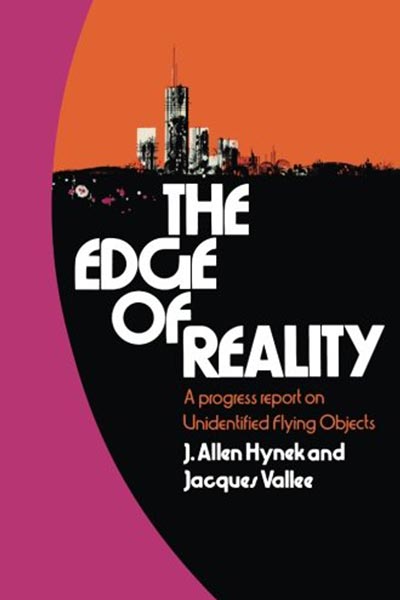
The Edge of Reality
(1975)
A progress Report on Unidentified Flying Objects
by J. Allen Hynek and Jacques Vallée
Two of our country’s most eminent scientists, both of whom have studied the UFO phenomenon for decades, have collaborated on this report of what serious scientists now believe about it. And they show that an increasing number of scientists are taking the UFO subject seriously.
From the outset, Hynek and Vallée make their position clear: UFOs represent an unknown but real phenomenon. The far-reaching implications take us to the very edge of what we consider the known and real in our physical environment. Perhaps, say the authors, UFOs signal the existence of a domain of nature as yet totally unexplored.
In this mind-stretching book, the authors sample UFO reports—including those allegedly involving humanoids—and describe the patterns that have been perceived in the behavior of the phenomenon.
They also establish a framework for the further study of the UFO phenomenon. Where might such study lead? What can be studied, and how? What is the real nature of the UFO phenomenon? Does it originate with the actions of other intelligences in the universe? Does the UFO phenomenon have a purely physical explanation, or is there a vaster, hidden realm that holds the solution?
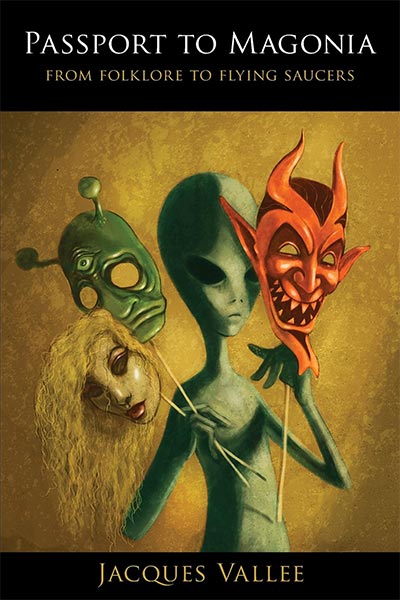
Passport to Magonia
(1969)
From Folklore to Flying Saucers
It is readily acknowledged that our time has surpassed all epochs in history for the accumulation of technical knowledge, physical power over our environment, and economic might. It is less often pointed out, however, that our age has generated, and continues to generate, mythical material almost unparalleled in quantity and quality in the rich records of human imagination. More precisely, people have very frequently reported the observation of wonderful aerial objects, variously designated as flying saucers, unidentified flying objects (UFOs), and so on; among these narratives descriptions of landings made by these craft are commonplace; and that quite a few accounts purport to inform us of the physical characteristics, the psychological behaviour, and the motivation of their occupants. But investigators have neglected to recognize one important perspective of the phenomenon: the fact that beliefs identical to those held today have recurred throughout recorded history and under forms best adapted to the believer’s country, race, and social regime. If we take a wide sample of this historical material, we find that it is organized around one central theme: visitation by an aerial people from one or more remote, legendary countries. The names and attributes vary, but the main idea clearly does not. Magonia, heaven, hell, Elfland – all such places have in common one characteristic: we are unable to reach them alive, except on very special occasions. Emissaries from these supernatural abodes come to earth, sometimes under human form and sometimes as monsters. They perform wonders. They serve man or fight him. They influence civilizations through mystical revelation. They seduce earth women, and the few heroes who dare seek their friendship find the girls from Elfland endowed with desires that betray a carnal, rather than purely aerial, nature. These matters are the subject of Passport to Magonia, Jacques Vallée’s seminal master-work that changed our understanding of the UFO phenomenon. An instant classic when first published in 1969, the book remains a must-have resource for anybody interested in the topics of UFOs and alien contact, as well as those fascinated by fairy folklore and other paranormal encounters.

Challenge to Science: The UFO Enigma
(1966)
Unidentified Objects in Space – A Scientific Appraisal
Does intelligence exist elsewhere in the universe? Here is the up-to-the-minute book detailing hundreds of the latest reports on U.F.O.s
“I found ANATOMY OF A PHENOMENON extremely interesting and well written. I believe it is the most scientific…discussion of the problem that I have yet encountered.”
Professor Frank Salisbury
Colorado State University
FICTION
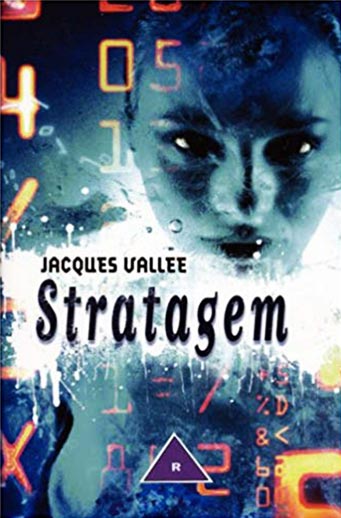
Stratagem
(2007)
When Mark Harris, a financial executive from Silicon Valley, goes on a fishing trip to Brazil with his friend Robert, he is not looking for UFOs. Confronted with huge objects the size of a city that lift out of the waters of the Amazon, the two men are infuriated by the official denials that greet their story. They soon become the target of a determined commando, ready to kill to get the evidence they hold.
Evidence of what? Everybody knows that UFOs do not exist: Scientists have proven they were the product of hallucinations or illusions, and official projects designed to study them have been shelved. Is there a diabolical cover-up behind these reassuring statements?
Desperate to get at the truth, Robert and Mark set a trap to force their opponents to reveal themselves. All hell breaks loose when the blackest project ever devised by the Pentagon swallows the bait and leads Robert and Mark to a surprising – and devastatingly simple – solution. But who is the woman with the green eyes? And what if UFOs turned out not to be from another planet after all?
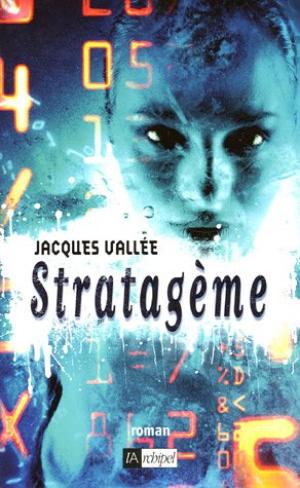
Stratagème
(2006)
Lorsque Mark Harris, financier californien, embarque pour une partie de pêche sur le fleuve Amazone avec son ami Robert, il n’a nulle intention de s’intéresser aux phénomènes paranormaux. Pourtant, une apparition violente et étrange va bouleverser sa vie… De retour aux Etats-Unis, la recherche de la vérité devient une obsession. Alors que Mark et Robert se heurtent au déni des autorités, ils ne tardent pas à devenir la cible d’un commando déterminé, prêt à tuer pour mettre la main sur certaines preuves. Chacun sait pourtant que les ovnis n’existent pas… Mark veut comprendre ce qui s’est passé au Brésil, quelles forces sont venues le meurtrir. Ses contacts dans les milieux de la technologie et des finances l’introduisent dans de hautes sphères, où il risque sa fortune… et sa vie. Se pourrait-il qu’il se trouve au cur de la plus vaste entreprise de dissimulation jamais menée par le Pentagone ?
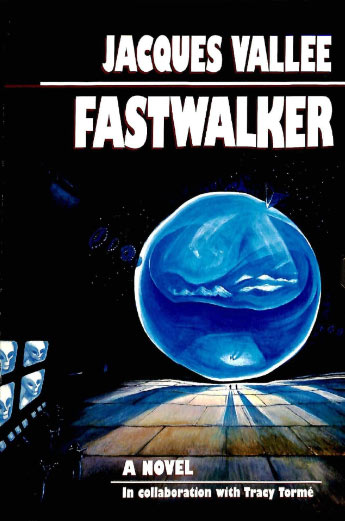
Fastwalker
(1996)
An Air Force pilot has died in a strange accident over Dreamland, a secret base in Nevada. The President of the United States has not yet been briefed. Scientists from all over the world are being assembled inside Pyramid Base. The Manipulator is General Bushnell, head of a secret organization which has been trying to capture a flying saucer since the early days of the UFO mystery. Suave but utterly ruthless this cold warrior has every tool of high-tech wizardry at his fingertips and a crack team of skilled operatives under his control. The investigator is Peter Keller, a dedicated journalist with a lot to prove, struggling to keep his integrity in the sensational atmosphere of tabloid media. A flawed but gusty professional, he’s ready to travel to the ends of the Earth to solve the mystery of UFO abductions. The victim is Rachel Rand, a young woman caught between the nightmarish alien beings who stalked her on a lonely Long Island road and a bizarre cult of UFO believers who are convinced that the end of the world is imminent. Can she trust the man she loves to help her discover the truth about her tormentors?
Now an unearthly craft has been secretly captured by the scientific team of General Bushnell. What it contains can indeed spell the end of human history as we know it. But are human beings ready for that knowledge? And who will control it?
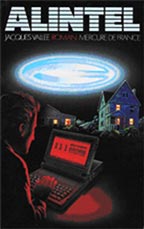
Alintel
(1986)
“Simple action, amplified to the point of terror, within an apparently normal environment¦ An excellent story where the detective suspense mixes with science-fiction. That’s remarkably efficient!”
VSD, 27 February 1986
“The politicians’ attitude is one of Jacques Vallee’s strong ideas in ALINTEL. And here is another: The visitors do not come from space!”
Actuel no.77, March 1986
“In this novel that comes at the right time, Jacques Vallee answers the call of the future. The fiction of the nineties has just been born.”
Ouest France, 28 February 1986
“An astonishing book, at the crossroads of detective stories and science-fiction.”
L’Autre Journal, 19 March 1986
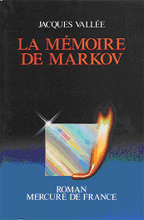
La Mémoire de Markov
(1986)
“In the unforgiving universe of Silicon Valley, amidst unbridled liberalism and savage competition, computer networks are compromised by 20-something hackers who stay for weeks in front of their screens, while artificial intelligence systems interfere maliciously with ongoing investigations.”
Livres de France, November 1986
“Jacques Vallee has found a way to exploit his knowledge of the high technology universe to create unexpected twists that preserve the story’s suspense.”
01 Hebdo, 8 December 1986
“Why are the holographic memories in the car’s trunk labeled X rather than Y? The reader gets caught up quickly in the enigma posed by Jacques Vallee in this well-structured science-fiction novel. Action is fast-paced, characters are well-developed, and the style is quick and refined.”
Le Monde Informatique, 15 December 1986
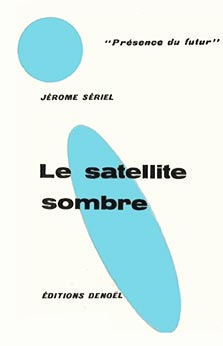
Le Satellite Sombre
(1962)
Bob Allinquay has never done anything right. At this very moment, at the wheel of his big crinonx, a Mercedes 800SL, he must be rushing on the Pekin-Paris geostrade, and I wonder in what kind of disaster he is about to drag me. On Christmas Eve, too! A very tricky game. If only I knew what’s happened to the electronic computer. Will I even have time to act? What if that so-called mission to Venus was only designed to take me away from the laboratory? And who the hell is Xarius?
“Dark Satellite is one of the most interesting anticipation novels we have had the opportunity to read recently. (It) is noticeably better than Le Sub-Espace, because Sériel’s prose has gained in density, in efficacy and also in clarity. The portrait he draws of the future of Paris is a small chef-d’oeuvre, as well as the precise, but too-quick images of foreign worlds and alien machines. There is inspiration in Dark Satellite.”
Gérard Klein in Fiction Magazine, January 1963

O Satélite Sombrioe
(1962)
(Portugese edition of Le Satellite Sombre)
Romance de tensào e violência, “O Satélite Sombrio” mostra que a espionagem continuará a existir – até no ano 2148… Em que condições? No meio de que perigos? Eis as perguntas a que dá resposta a história apaixonante de Bob Allinquay.
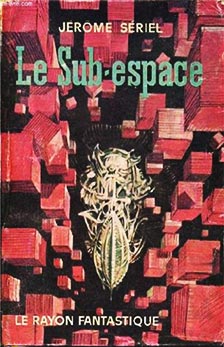
Le Sub-Espace
(1961)
Jules Verne Prize (1961)
Published under the pen name “Jérôme Sériel”
The complex technology of the XXI st century has scattered colorful forms of life throughout the planets of the solar system. But when unexplained events suddenly take place, what will be the reactions of the scientists at the center of the drama? Will they be able to transcend all limits? Will they detect the fantastic dangers that await them? Is “Sub-space” only a universe of insanity? Or can we discover new horizons beyond space and time, at the end of the unforgettable journey of the “Drakkar”?
“Every year in June, the Eiffel tower serves as a launching pad for a young author of ” science fiction, ” naturally. On the first floor, in the salons of the restaurant, the Jules Verne prize is given to an anticipation novelist. This year, the laureate is M. Jérôme Sériel, author of Le Sub-Espace. He explained that sub-space is a universe that serves as a twin to our everyday space, and is only reached accidentally by non-human beings. As a result of a series of mistakes, naturally ascribable to earthlings, an astounding war is triggered in this extraordinary region.”
France-Soir
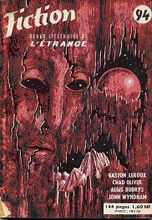
Short Stories in FICTION magazine
(1961-1965)
Paris: OPTA
Published under the pen name “Jérôme Sériel”
No. 94 Sept. 1961: Les Calmars d’Andromáde
No.107 Oct.1962 : L’Oeil du Sgal
No.110 Jan.1963 : Les Planátes d’Aval
Spécial No.4 1963 : Le Satellite Artificiel (Anthologie de la science-fiction française)
No.145 Dec.1965 : Le Fabricant d’Evénements Inéluctables